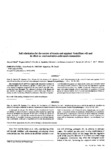Please use this identifier to cite or link to this item:
http://www.alice.cnptia.embrapa.br/alice/handle/doc/11858| Title: | Soil solarization for the control of tomato and eggplant Verticillium wilt and its effect on weed and micro-arthropod communities. |
| Authors: | GHINI, R.  BETTIOL, W.   SPADOTTO, C. A.   MORAES, G. J. de   PARAIBA, L. C.   MINEIRO, J. L. de C.   |
| Affiliation: | RAQUEL GHINI, CNPMA; WAGNER BETTIOL, CNPMA; CLAUDIO APARECIDO SPADOTTO, EMBRAPA-CNPMA; GILBERTO J. de MORAES, EMBRAPA-CNPMA; LOURIVAL COSTA PARAIBA, CNPMA; JEFERSON L. de C. MINEIRO, EMBRAPA-CNPMA. |
| Date Issued: | 1993 |
| Citation: | Summa Phytopathologica, v.19, n.3/4, p.183-189, jun./dez.1993. |
| Description: | Soil solarization for 30 and 50 days significantly reduced the incidence of Verticillium dahliae wilt in tomatoes, and had a residual effect on the level of the disease in eggplants transplanted to the same field 45 days after tomato plants had been eliminated. The reduction in the level of the disease did not, however, correspond to an increase in yield in both crops. Weed community was also considerably affected by solarization. The relative importance of dicotiledoneous plants was higher in the control plots and plots treated with methyl bromide; whereas in solaried plots the importances of grasses and dicotiledoneous plants were similar. In general, solarization and treatment with methyl bromide reduced considerably the population of several groups of mites and insects, but 11.5 months later the population of these organisms again became similar to that in control plots. |
| Thesagro: | Verticillium |
| NAL Thesaurus: | biological control weeds soil |
| Keywords: | Solarization Warming Microorganism Tomato Eggplant Fungus Disease Microarthropod Community Insect Pest Arthropod |
| Type of Material: | Artigo de periódico |
| Access: | openAccess |
| Appears in Collections: | Artigo em periódico indexado (CNPMA)  |
Files in This Item:
| File | Description | Size | Format | |
|---|---|---|---|---|
| 1993AP011GhiniSoil2492.PDF | 252,99 kB | Adobe PDF |  View/Open |









